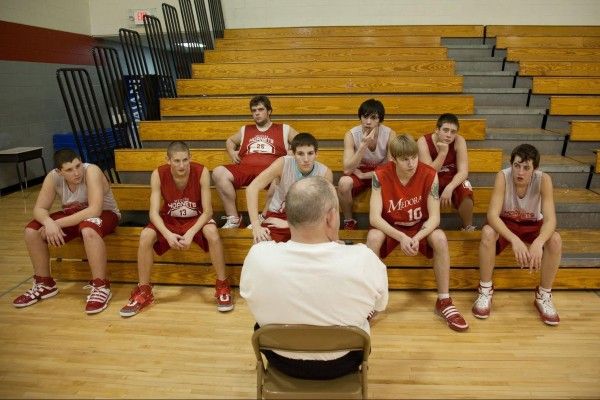The small factory town is dead, and it's not coming back. We can talk about the heartland with nostalgic fondness, but it's almost become meaningless since we know that these are the ghost towns of the 21st century. Medora puts a human face not on an issue or a political argument but simply presents of a reality of impoverish people who could drown in despair, and decide to proudly fight for a win. Any victory will do, and Andrew Cohn and Davy Rothbart's documentary celebrates perseverance without ever reducing the concept down to a motivational poster.
In the small farming community of Medora, Indiana, the high school basketball team can't even come close to winning a game. It's not their fault. Other towns have consolidated their schools, and therefore have a larger talent pool. The result is that it hurts to watch the Medora Hornets, a former championship team with its heyday during the factory town's glory years in the mid-20th century. Today, the Washington Generals have a better shot at victory. But the Hornets' losing streak has become a symbol of the town's decline and the difficult personal lives of the players who come from poverty and broken homes. If the town and players are tied to the team, then one victory could mean more than anything, even if it's just a high school basketball game.
In 1989, Michael Moore's first documentary, Roger & Me, was released. The film is about the decline of Flint, Michigan where he was born. It's Moore's best film because it's a personal story rather than agitprop, and although it bears his trademarks that would eventually become tiresome, it does tap into Moore representing "the little guy." But it also put him front and center, thus establishing Moore as a personality, who would eventually turn his dead birthplace into a prop rather than a personal story. Cohn and Rothbart let their young subjects do all the talking, and the result is absolutely heartbreaking at times. Moore was looking back at what was lost for him, but over 20 years later these kids are still living in the same wreckage of America's industrial downfall.
Early in the film, a shopkeeper is asked to describe Medora in one word. "Closed," she replies. Far more than just the shops and the factories have shut down; the opportunities have dried up as well. While the American Dream now includes an almost mandatory trip to a four-year college, the young people of Medora seemingly only have a few options: technical school, the army, or the seminary. College is an impossible dream. A kid like Rusty Rogers would be happy to have a home and his mom out of rehab. The players on the team—just like any child in Medora—were born into this, and there's no recovery on the way.
It would be so easy to launch into a political argument and use Medora as the example. Cohn and Rothbart are better than that. They respect their subjects too much to turn them into poster children or political props. The most political the film gets is briefly taking a clip from one of Barack Obama's State of the Union addresses where the President is noting how jobs have left the heartland, and we get the sense that the directors would still use this general statement if the President was a Republican. These kids don't care about politics. They care about winning a basketball game.
I sucked at sports as a kid (and I'm not much better at them as an adult). I was the kid you didn't pass the ball to, and the one placed near the end of the batting order. But after the loss, I would usually shrug it off, get my mandatory reward of juice and a Kudos bar, and go home. I didn't need to cling to that win (although I confess to being bummed out; I'm a competitive person), but in Medora, you feel for how badly these young players want that victory. Their first-year coach isn't a bad guy, but he's not Coach Taylor coming to inspire the down-and-out poor kids to greatness. Like in their personal lives, much is placed on their shoulders, and so they can't simply enjoy the game. They have no shot at a championship, and the town doesn't expect a trophy, but we want to cheer as hard as we can for the Hornets. It's not out of pity or the automatic desire to root for the underdog, but dammit, these kids should have so much more in life, so is a win at basketball too much to ask?
Even if we don't come from a small town like Medora, the documentary lets us tap into that desire for one win. The film provides perspective on how badly we may want to win, but we should be mindful of those who need to win because victory is a rare commodity. It still plays into an American Dream that has all but proven false, but we still want to believe that if you work hard enough, you'll succeed. Too often, we take that as advice and motivation for our own lives. A large part of what makes Medora so deeply moving is that it makes us want the American Dream for our fellow Americans.
It's easy to be cynical about sports movies and say that they all turn on winning and losing. The crappy ones do. The best ones look beyond the court or playing field, and ask what the value of that win or loss truly means. Likewise, it's easy to be dismissive about the state of American's heartland, and fall into a political debate about who's to blame for towns where hope has been washed away. Although the film is occasionally guilty of romanticizing the concept of the small town, the documentary mostly stays true to both the hardship and the perseverance of Medora's citizens. Medora powerfully pushes past our defenses and indifference to remind us that when almost nothing is left, a win can mean everything.
Rating: A-
Click here for all of our SXSW 2013 coverage. Click on the links below for my other reviews:


